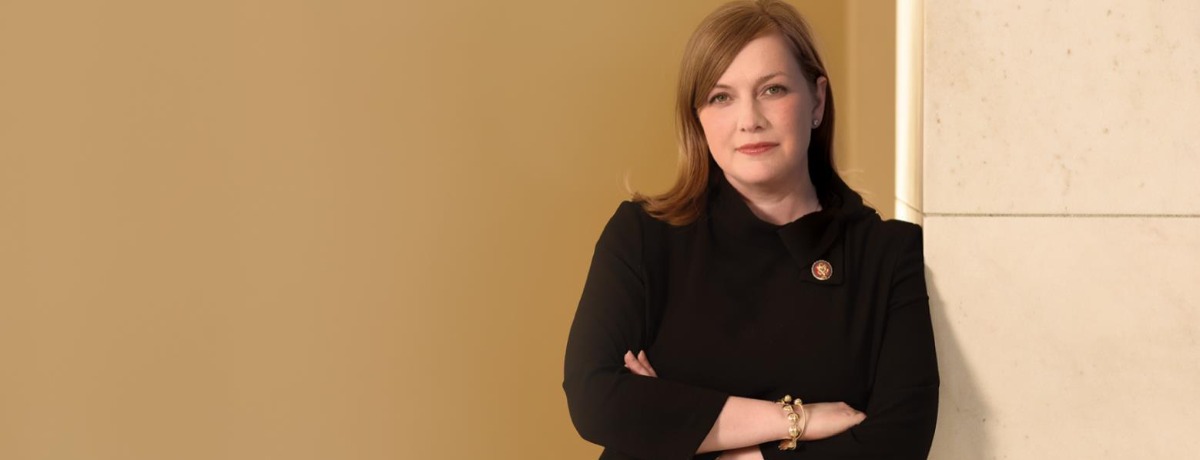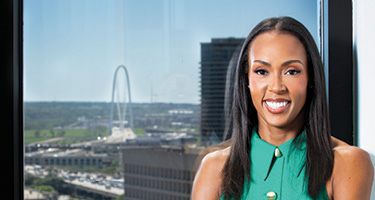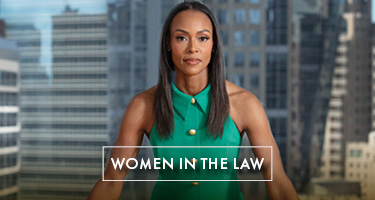For more than 50 years, Texas’s Seventh Congressional District was a Republican stronghold that spawned GOP stalwarts including George H.W. Bush and Bill Archer.
Then Elizabeth Ann Pannill “Lizzie” Fletcher came along.
The then-43-year-old underdog, a commercial litigator, unseated nine-term incumbent John Culberson last November, a major upset that helped flip control of the House to the Democrats.
While the 2018 midterms marked Fletcher’s political debut, they certainly weren’t the first time she surmounted stacked odds. Having made equity partner at the Houston firm Ahmad, Zavitsanos, Anaipakos, Alavi, & Mensing (AZA) by the time she turned 40, Fletcher reached a milestone in her legal career most don’t get to until their fifties—one that less than a quarter of female attorneys will ever reach. In a recent interview, the newly seated Rep. Fletcher discussed her past life in litigation, and how she plans to apply lessons learned in court and on the campaign trail to her tenure in Congress.
[This interview has been edited for length and clarity.]
I assume you’re aware that the odds are not in favor of women making partner. The National Association of Women Lawyers’ 2018 survey on retention and promotion of women, released in October, showed that only 20 percent of equity partners in law firms are female. Yet you became the first female partner at AZA.
I’m generally familiar with some of those statistics, and have seen it in real life as well. I graduated from law school in 2006 and went to work at Vinson & Elkins. It was a great experience. I got to work on some really terrific cases with great clients—from an individual arbitration where I was representing a former executive who had been terminated and denied his compensation, to a $6 billion merger challenge in Delaware with a huge trial team and a great result for our client.
I moved to AZA after a few years at V&E, in part because I was ready to get a certain set of experiences that I thought I could best get at a small firm: a little more courtroom time, a little more first-chair trial experience. What I found in general is that the dynamics are changing. A lot of the litigation boutiques—certainly in Houston, and I think around the country—are kind of stuffed into a space. There’s a lot more great litigation happening at boutiques.
AZA was one of the leading firms in Houston. I went over there and got terrific opportunities to be on the front lines—going into things not necessarily knowing what I was getting into, running down to the courthouse to cover a hearing, and just getting exposed to doing things in a way that helped me become a much better lawyer, in part because I had to. I was the person there who could do it.
What were your major hurdles along the way?
Just learning the craft is a long process. The funny thing is, when I decided to run for office, one of my partners said, “Why would you do that? You’re just getting to this point where you’re at the peak of your career.” I think he was right. Every experience I had, every case I worked on gave me perspective. I had the benefit of working with incredibly smart, thoughtful colleagues at both of those law firms. Everybody was creative and not willing to let problems get in the way. As a lawyer with an active litigation practice, you tackle so many things, whether thorny issues dealing with your trial strategy or learning things long after you wished you had.
Though I’ve heard that networking is a challenge for some other folks, I had great people help me along the way. That’s what every young lawyer needs: people who help them understand what they’re doing, why they’re doing it, and how they can do it better.
To echo your associate’s question, what prompted you to leave at the peak of your career and take the huge risk of challenging a nine-term incumbent Republican in Texas?
I had spent the better part of a decade with my head down, trying to learn the craft and become a partner in a law firm. After the 2016 election, I thought, “I don’t think this represents my community. I don’t think these are my values represented here. If that’s the case, I need to do something about it.”
It was just a moment of feeling there was a higher calling. I had a simple analogy at the beginning. “I represent people for a living. How hard can [politics] be?” I found that it’s very different. I went from representing an individual or a handful of people, or one entity, to representing more than 700,000 at the same time.
I do think there are a lot of skills we have as lawyers that are really important in this job. First of all, you learn that you’re not the expert on anything, but that your clients are. You learn to listen to them. You’re not going to know the facts of the case or understand how some of these businesses work unless they explain it to you. What we do need a lot of our representatives doing is listening to people about their challenges and their problems, and how we can work together to solve them.
I really feel like we’re at a critical juncture in our history. We were headed down the wrong path. I had the fortune to have supportive partners who were encouraging of [my run for office]—they encouraged me to do it, and I kept my role as a partner in the firm until after the election. Had I not won, I would’ve gone right back to work in my office in downtown Houston. My partners were very supportive of the effort. They’re not all Democrats.
As a politician, you’re expected to take clear public stands on polarizing issues. I imagine that could create some friction within a firm. How did you navigate that?
The firm I came from had a wide diversity of experience, background, and political belief. We all kind of accepted those things about each other. We didn’t all see eye to eye. But that led to some robust debate about a lot of issues, and I think we were stronger for it. No matter the issue, you have people approaching it from different perspectives.
I never felt that there would be any kind of backlash, in part because most of the things I expressed as a candidate were things I had expressed as my personal views long before.
One important thing to remember is that lawyers represent their clients. Our job as lawyers is to speak for them, step into their shoes, and make their voices heard. It doesn’t necessarily mean we endorse the positions our clients have taken. It’s important to be able to separate your lawyering from your own views. That's different in the political arena.
Many have credited your win to the fact that you appealed to far-left progressives, moderate Democrats, and even some Republican supporters alike, which is no small feat. How do you intend to continue this in Congress?
My goal is to engage everyone in the process. I know that I represent everyone who lives in my district whether they voted for me or not. I’m interested in hearing their feedback, finding common ground, and building bridges.
In my experience, and I saw this as a lawyer, we agree on a whole lot more than we disagree on. These are certainly polarized times, but I think some of those divisions are highlighted in the issue of the day as we watch the news. There are so many places where we can, and do, work together.
I’ll give you an example. The day after the 2016 election, I was in a corporate deposition, and we found ourselves chatting about politics. We had voted differently, but we agreed on probably 80 percent of the things we talked about. We can move things forward. A good example is what we’ve already done here. Last week, we voted on improving background checks for all gun sales. That was something that Republicans and Democrats in my district told me they supported by overwhelming margins.
I come from Texas, where we have a tradition of hunting and fishing and family experiences of going out doing those things together. There were some common-sense concerns, but for the most part my constituents who are gun owners said, “I agree with these background checks.” We need to move that kind of legislation forward. We need to move beyond labels and start talking to each other like neighbors. When we do that, we’ll see that people agree on a whole lot of things.
That’s especially true now for my district and my committee work. I’m on the Transportation and Infrastructure Committee. There are a lot of concerns about transportation and infrastructure in Houston. That is not a terribly partisan committee, and it’s a place where I can get a lot of good work done.
Houston is an incredibly diverse and welcoming city. We’re proud that we put a man on the moon. We don’t let problems get in our way. That’s what we want to see people doing in Washington, in an inclusive and bipartisan way.
In my experience, and I saw this as a lawyer, we agree on a whole lot more than we disagree on.
Could your approach within your district be applied on a national level?
I think it has to be! That was a big part of the message: We do things successfully here. We work together very well. We need to see more of that in Washington.
I was in a hearing the other day. One of my colleagues was talking about climate change and the state of the oceans. One of my Republican colleagues said, “I believe we should leave the earth better than we found it.” I think we all agree with that. There are policy questions about how do we do that. If we can find those shared values, we can have constructive conversations about how we do it.
It’s common for legal professionals to enter the public sector. I imagine the world of a private-practice commercial litigator must be drastically different than that of a member of Congress—or any public figure, for that matter. What was the most significant part of making that transition?
You do things a little differently here. The other day I found myself in a hearing, wanting to object to something as totally irrelevant. That’s not an option! It’s a different forum than the courtroom.
When you’re trying a case, you’re living and breathing those facts and that case and the issues and the law. There’s something really satisfying about that. Here, there are so many more things I need to understand and be working on at any one time. That’s challenging.
It’s hard for me not to do some of the things I would’ve done as a lawyer. I spend a lot less time behind my desk writing briefs myself. I still want to read all the legislation and make sure I understand it. There’s such a high volume.
It’s a really incredible opportunity to be the voice of my constituents and my district. It’s an incredible privilege. The challenges are outweighed by the opportunities to be of service and to be helpful.
You’re on the Science, Space, and Technology Committee as well as Transportation and Infrastructure. Why are these of special interest to you?
The reason I asked for these two committees is because their jurisdiction covers things that are really important to my district. I know those things because I’ve been working for a dozen years as a lawyer for people in the district, representing all kinds of businesses, from mom-and-pop operations and individuals all the way up to major international companies.
Transportation and infrastructure are two key issues. After [Hurricane] Harvey, of course, we’re very focused on FEMA recovery efforts. I’ll have oversight over FEMA. I also sit on the Water Resource Subcommittee. That has oversight of the Army Corps of Engineers, which has a major presence in my district managing our waterways and bayous, which flooded during Harvey.
I also sit on the subcommittee that oversees railroads and pipelines. As a lawyer, I have a bit of experience representing midstream companies and pipelines. I have a little bit of background to bring to that, which I think is useful.
Then, on the Science, Space, and Technology Committee, I serve on two subcommittees. I’m on the Energy Subcommittee, and I’m the Chair for the Environment Subcommittee. Those issues are of critical importance to my district. I represent the energy capital of the world. There is a geographic area in my district called the Energy Corridor. Energy is what we do.
It’s really important for our district to lead this conversation about our energy future, working together to address the challenges we face with our changing climate and various environmental concerns. We need to bring everybody into that process and come together to figure out our path forward.
Environmentalists and corporations often seem to be working against each other. How do you facilitate a productive conversation amid conflicting interests?
What we see in our community is that people work well together. A lot of the people who are concerned and vocal about the environment are the very people who work in a lot of these companies in the energy industry. I don’t think you have to choose between the two.
Finding ways to move forward is what the people of my district sent me here to do, and it’s what we have to do for our future. We have good partnerships across the community on a lot of these issues. Leading by example and bringing everybody to the table is exactly what we need to do.
Given your experience in office so far, what’s your biggest hope for the federal government in 2019?
I think this division that has emerged in the last few years can be healed by working together and making real progress. What I really want is for people to have their faith restored that our government is working for the people.
There are a whole lot of new members of Congress just like me—who haven’t run for office before but who care deeply about our country. My hope is that we’ll be able to make progress and that people will see it and feel good about the direction we’re headed.
We’ve had problems to solve. We’ll continue to have problems to solve. I think if we work together, we’ll be able to tackle even the toughest challenges. I hope we’re able to do that, and that we’re able to restore people's faith in our democracy.
































